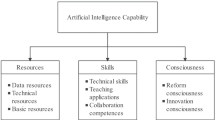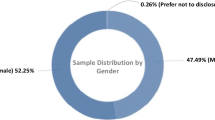Abstract
The purpose of this paper is to propose a method to improve the curriculum system in higher education institutions by taking use of the Lean Six Sigma (LSS) framework incorporated with big data analysis. The Lean Six Sigma Define-Measure-Analyze-Improve-Control methodology combined with text analysis, knowledge graph analysis and topology graph analysis are used. The proposed method can improve the curriculum system and better meet the talent market requirements, the technical requirements, and the social requirements. Little study uses the LSS framework and big data analysis to improvement the curriculum system. However, big data is an effective and efficient tool and is the trend to be used to help to make decision. This paper proposed the detailed improvement process using both LSS framework and big data analysis.












Similar content being viewed by others
References
Abu Bakar FA, Subari K, Daril MAM (2015) Critical success factors of lean six sigma deployment: a current review. Int J Lean Six Sigma 6(4):339–348. https://doi.org/10.1108/ijlss-04-2015-0011
Al Kuwaiti A, Subbarayalu AV (2015) Appraisal of students experience survey (SES) as a measure to manage the quality of higher education in the Kingdom of Saudi Arabia: an institutional study using six sigma model. Educ Stud 41(4):430–443. https://doi.org/10.1080/03055698.2015.1043977
Albliwi SA, Antony J, Lim SAH (2015) A systematic review of lean six sigma for the manufacturing industry. Bus Process Manag J 21(3):665–691. https://doi.org/10.1108/bpmj-03-2014-0019
Amitrano FG, Estorilio CCA, Bessa LDF, Hatakeyama K (2016) Six Sigma application in small enterprise. Concurr Eng Res Appl 24(1):69–82. https://doi.org/10.1177/1063293x15594212
Antony J, Krishan N, Cullen D, Kumar M (2012) Lean Six Sigma for higher education institutions (HEIs). Int J Product Perform Manag. https://doi.org/10.1108/17410401211277165
Antony J, Rodgers B, Gijo EV (2016) Can Lean Six Sigma make UK public sector organisations more efficient and effective? Int J Product Perform Manag 65(7):995–1002. https://doi.org/10.1108/ijppm-03-2016-0069
Antony J, Snee R, Hoerl R (2017) Lean Six Sigma: yesterday, today and tomorrow. Int J Qual Reliab Manage 34(7):1073–1093. https://doi.org/10.1108/ijqrm-03-2016-0035
Cudney EA, Venuthurumilli SSJ, Materla T, Antony J (2020) Systematic review of lean and six sigma approaches in higher education. Total Qual Manag Bus Excell 31(3–4):231–244. https://doi.org/10.1080/14783363.2017.1422977
Furterer SL, Schneider K, Key MB, Zalewski D, Laudenberger M (2019) Implementing lean six sigma and discrete-event simulation for tutoring operations in higher education institutions. Int J Lean Six Sigma 10(4):909–927. https://doi.org/10.1108/ijlss-08-2018-0084
Gupta S, Modgil S, Gunasekaran A (2020) Big data in lean six sigma: a review and further research directions. Int J Prod Res 58(3):947–969. https://doi.org/10.1080/00207543.2019.1598599
Hess JD, Benjamin BA (2015) Applying lean six sigma within the university: opportunities for process improvement and cultural change. Int J Lean Six Sigma 6(3):249–262. https://doi.org/10.1108/ijlss-12-2014-0036
Kumar M, Antony J, Madu CN, Montgomery DC, Park SH (2008) Common myths of Six Sigma demystified. Int J Qual Reliab Manag 25(8):878–895. https://doi.org/10.1108/02656710810898658
Kumar S, Luthra S, Govindan K, Kumar N, Haleem A (2016) Barriers in green lean six sigma product development process: an ISM approach. Prod Plan Control 27(7–8):604–620. https://doi.org/10.1080/09537287.2016.1165307
Kwak YH, Anbari FT (2009) Analyzing project management research: Perspectives from top management journals. Int J Project Manage 27(5):435–446. https://doi.org/10.1016/j.ijproman.2008.08.004
Laureani A, Antony J (2018) Leadership - a critical success factor for the effective implementation of lean six sigma. Total Qual Manag Bus Excell 29(5–6):502–523. https://doi.org/10.1080/14783363.2016.1211480
Laureani A, Antony J, Douglas A (2010) Lean six sigma in a call centre: a case study. Int J Product Perform Manag 59(8):757–768. https://doi.org/10.1108/17410401011089454
Laux C, Li N, Seliger C, Springer J (2017) Impacting Big Data analytics in higher education through Six Sigma techniques. Int J Product Perform Manag 66(5):662–679. https://doi.org/10.1108/ijppm-09-2016-0194
Li N, Laux CM, Antony J (2019) How to use lean Six Sigma methodology to improve service process in higher education A case study. Int J Lean Six Sigma 10(4):883–908. https://doi.org/10.1108/ijlss-11-2018-0133
Lu J, Laux C, Antony J (2017) Lean Six Sigma leadership in higher education institutions. Int J Product Perform Manag 66(5):638–650. https://doi.org/10.1108/ijppm-09-2016-0195
Mueller PS, Cross JA (2020) Factors impacting individual Six Sigma adoption. Int J Lean Six Sigma 11(1):57–83. https://doi.org/10.1108/ijlss-04-2018-0040
Oliver J, Oliver Z, Chen C (2019) Applying lean six sigma to grading process improvement. Int J Lean Six Sigma 10(4):992–1017. https://doi.org/10.1108/ijlss-03-2018-0029
O’Reilly SJ, Healy J, Murphy T, O’Dubhghaill R (2019) Lean six sigma in higher education institutes: an Irish case study. Int J Lean Six Sigma 10(4):948–974. https://doi.org/10.1108/ijlss-08-2018-0088
Ornstein AC, Hunkins FP (1988) Implementing curriculum changes-Guidelines for Principals. NASSP Bull 72(511):67–72. https://doi.org/10.1177/019263658807251116
Pacheco D, Pergher I, Vaccaro GLR, Jung CF, ten Caten C (2015) 18 comparative aspects between lean and six sigma complementarity and implications. Int J Lean Six Sigma 6(2):161–175. https://doi.org/10.1108/ijlss-05-2014-0012
Parast MM (2011) The effect of Six Sigma projects on innovation and firm performance. Int J Project Manage 29(1):45–55. https://doi.org/10.1016/j.ijproman.2010.01.006
Pillai AKR, Pundir AK, Ganapathy L (2012) Implementing integrated Lean Six Sigma for software development: a flexibility framework for managing the continuity: Change dichotomy. Glob J Flex Syst Manag 13(2):107–116. https://doi.org/10.1007/s40171-012-0009-2
Rathilall R, Singh S (2018) A Lean Six Sigma framework to enhance the competitiveness in selected automotive component manufacturing organisations. South African J Econ Manag Sci. https://doi.org/10.4102/sajems.v21i1.1852
Raval SJ, Kant R (2017) Study on lean six sigma frameworks: a critical literature review. Int J Lean Six Sigma 8(3):275–334. https://doi.org/10.1108/ijlss-02-2016-0003
Schroeder RG, Linderman K, Liedtke C, Choo AS (2008) Six sigma: definition and underlying theory. J Oper Manag 26(4):536–554. https://doi.org/10.1016/j.jom.2007.06.007
Sreeram TR, Thondiyath A (2015) Combining lean and six sigma in the context of Systems Engineering design. Int J Lean Six Sigma 6(4):290–312. https://doi.org/10.1108/ijlss-07-2014-0022
Srinivasan K, Muthu S, Devadasan SR, Sugumaran C (2016) Enhancement of sigma level in the manufacturing of furnace nozzle through DMAIC approach of Six Sigma: a case study. Prod Plan Control 27(10):810–822. https://doi.org/10.1080/09537287.2016.1143130
Sunder MV (2013) Synergies of lean six sigma. IUP J Oper Manag 12(1):21
Sunder MV (2016) Lean six sigma in higher education institutions. Int J Qual Serv Sci 8(2):159–178. https://doi.org/10.1108/ijqss-04-2015.0043
Svensson C, Antony J, Ba-Essa M, Bakhsh M, Albliwi S (2015) A lean six sigma program in higher education. Int J Qual Reliab Manag. https://doi.org/10.1108/ijqrm-09-2014-0141
Tetteh GA (2019) Evaluating university leadership performance using lean six sigma framework. Int J Lean Six Sigma 10(4):1018–1040. https://doi.org/10.1108/ijlss-05-2018-0051
Thomas A, Antony J, Haven-Tang C, Francis M, Fisher R (2017) Implementing Lean Six Sigma into curriculum design and delivery - a case study in higher education. Int J Product Perform Manag 66(5):577–597. https://doi.org/10.1108/ijppm-08-2016-0176
Wheeler-Webb J, Furterer SL (2019) A lean six sigma approach for improving university campus office moves. Int J Lean Six Sigma 10(4):928–947. https://doi.org/10.1108/ijlss-04-2018-0042
Yadav G, Desai TN (2016) Lean six sigma: a categorized review of the literature. Int J Lean Six Sigma 7(1):2–24. https://doi.org/10.1108/ijlss-05-2015-0015
Funding
The study is funded by National Natural Science Foundation of China (72004139), the Science and Technology Commission of Shanghai Municipality (20ZR1454500).
Author information
Authors and Affiliations
Contributions
SS conceptualized and designed research, interpreted data, supervised the research team, WF and LJ collected and analyzed data, drafted the manuscript, SS reviewed and edited the manuscript. The authors read and approved the final manuscript.
Corresponding author
Ethics declarations
Conflict of interest
The authors declare that they have no competing interests.
Availability of data and material
The datasets generated and/or analyzed during the current study are not publicly available due confidential issues but are available from the corresponding author on reasonable request.
Additional information
Publisher's Note
Springer Nature remains neutral with regard to jurisdictional claims in published maps and institutional affiliations.
Appendix A
Appendix A
Please rate the following statements, 1–5 (strongly disagree to strongly agree).
Questionnaire for students.
1–5 | |
The coherence between the curriculum and your level | |
The appropriateness of the content of the curriculum to your needs | |
The meaningfulness of the content of the curriculum to you | |
The curriculum’s reflecting recent developments | |
The appreciation of your ideas and suggestions regarding the curriculum used | |
Overall, your satisfaction to the curriculum system | |
Please state any additional ideas or suggestions | |
Questionnaire for teachers
1–5 | |
The coherence between your job and your personal traits | |
The coherence between the curriculum and the level of your students | |
The appropriateness of the content of the curriculum to the needs of your students | |
The meaningfulness of the content of the curriculum to you | |
The curriculum’s reflecting recent developments | |
The appreciation of your ideas and suggestions regarding the curriculum used | |
Overall, your satisfaction to the curriculum system | |
Please state any additional ideas or suggestions | |
Rights and permissions
About this article
Cite this article
Shanshan, S., Wenfei, L. & Lijuan, L. Applying lean six sigma incorporated with big data analysis to curriculum system improvement in higher education institutions. Int J Syst Assur Eng Manag 13, 641–656 (2022). https://doi.org/10.1007/s13198-021-01316-3
Received:
Revised:
Accepted:
Published:
Issue Date:
DOI: https://doi.org/10.1007/s13198-021-01316-3




